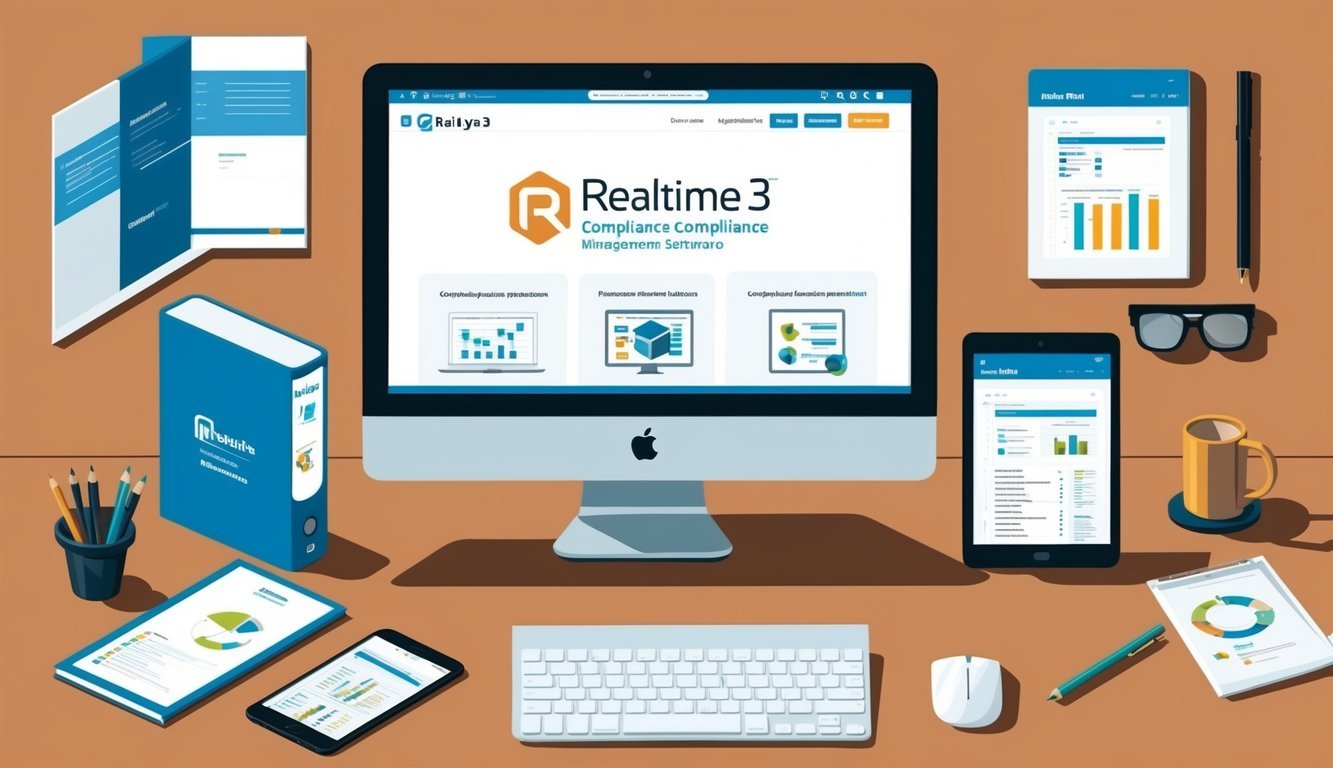Navigating legal and compliance requirements in real estate can be challenging, yet it is an essential part of the industry.
As a professional, understanding the right tools to streamline these processes can save time and reduce risk. Which tools can help you effectively manage compliance and legal tasks in real estate?

Arming yourself with the right resources enables you to protect your real estate practice from potential pitfalls and ensure smooth transactions.
Leveraging advanced solutions not only enhances efficiency but also boosts confidence in meeting regulatory demands.
By focusing on effective tools, you can uphold both legal standards and client trust in every transaction.
1) DocuSign
DocuSign offers a comprehensive solution for real estate professionals seeking to streamline their transactions.
With its eSignature technology, you can efficiently prepare, send, and sign documents.
This tool simplifies the entire process, saving you precious time and reducing reliance on paper-based transactions.
DocuSign provides access to the latest state and local association forms, ensuring your documents are always compliant with current regulations.
This centralized workspace allows you to organize and manage multiple transactions efficiently.
By utilizing such features, you can oversee each phase of a real estate deal with ease.
Furthermore, tools like Rooms for Real Estate integrate compliance and document management into a single platform.
This eliminates the need for printing, scanning, and emailing, streamlining your workflow and enhancing security.
Transactions become more secure with DocuSign, as it offers tracking and monitoring of document histories.
This ensures all parties are up-to-date and informed.
The flexibility of enhanced plans also allows customization to suit specific needs.
These plans provide scalable options that cater to different transaction volumes.
By using DocuSign, you gain a reliable partner in managing real estate documents and securing seamless operations throughout your business dealings.
2) Clio

Clio stands out as a leading legal software designed to enhance real estate legal practices.
It’s a comprehensive tool tailored to manage myriad aspects of a law firm’s daily operations.
You can easily organize case information, track time efficiently, and manage tasks seamlessly.
One of Clio’s strong points is its ability to streamline workflows.
It addresses common challenges like inefficiency and fragmentation by providing a more organized approach to legal tasks.
This makes Clio particularly beneficial for busy real estate professionals who need to stay on top of numerous transactions.
Clio offers an intuitive platform for managing clients, billing, and case details.
It is designed to facilitate smoother communication and coordination among team members, which is crucial in real estate operations.
With Clio, you can effectively manage and track legal processes, ensuring compliance and efficiency.
The software provides flexibility with its customization and integration features, aligning perfectly with the various needs of legal professionals.
For more details about these features, visit Clio’s customization and integration.
3) Compliance Management Software by Realtime

Compliance Management Software by Realtime is designed to streamline the compliance process for real estate professionals.
You can automate various regulatory and compliance tasks, which helps in maintaining the integrity of your real estate operations.
One key feature is real-time access to legal registers and relevant regulations.
This ensures that you always have up-to-date information and allows you to make informed decisions promptly.
Such capabilities are critical in a field where rules can frequently change.
The software also supports the automation of risk management tasks, making it easier for you to identify potential compliance issues before they become problematic.
This proactive approach can save time and resources by reducing potential legal complications.
By integrating this tool into your processes, you improve your ability to stay compliant with industry requirements.
This tool is tailored to help you efficiently manage audit cadences and other essential compliance workflows.
Understanding Legal Tools

Navigating real estate regulations demands proficiency in legal tools, crucial for compliance and efficiency.
This includes identifying key challenges and choosing suitable software.
Importance of Legal Tools
Legal tools ensure that you adhere to the complex web of local, state, and federal laws affecting real estate transactions.
Using these tools, you can protect your practice from potential legal pitfalls and streamline documentation processes.
They help in efficiently managing contracts, verifying property details, and handling disputes.
Implementing the right legal tools strengthens your ability to maintain compliance and reduces the risk of costly errors.
Common Legal Challenges in Real Estate
Real estate professionals often encounter various legal challenges that require careful management.
These can include issues related to zoning regulations, tenancy laws, and property title discrepancies.
Misunderstanding or misapplying these laws can result in substantial penalties.
Additionally, real estate transactions must frequently comply with anti-discrimination laws, complicating the legal landscape further.
Keeping updated with current regulations is vital to navigate these challenges successfully.
Selecting the Right Legal Software
Choosing the right legal software is essential for enhancing the efficiency and accuracy of real estate operations.
Consider software that provides robust features such as document management, compliance tracking, and e-signature capabilities.
Cost, user-friendliness, and customer support are equally important factors.
Evaluating software based on user reviews and trial versions can help in making an informed decision.
Implementing the right software solution simplifies complex legal processes.
Ensuring Compliance

Compliance in real estate involves understanding and adhering to a variety of laws, regulations, and ethical standards.
This section provides insights into key regulatory requirements, effective management practices, and the significance of technology in maintaining compliance.
Key Compliance Regulations
Real estate professionals must navigate an intricate web of regulations.
Federal, state, and local laws establish guidelines for property use, development, and transactions.
The importance of legal compliance includes adherence to these rules to prevent legal disputes and financial penalties.
Fair housing laws, environmental regulations, and zoning laws are critical areas to monitor closely.
Staying updated on changes to these regulations ensures compliance.
Regular training and consultation with legal experts can further safeguard against inadvertent infractions.
Compliance Management Practices
Effective compliance management requires systematic procedures.
Implementing a robust checklist during property transactions can aid in this process.
A real estate compliance checklist ensures you gather necessary documentation and verify all regulatory requirements are met.
Regular audits and reviews of your compliance processes can identify weaknesses and areas for improvement.
Involving your team in training sessions to keep them informed about the latest legal updates and best practices is crucial.
By maintaining a culture of transparency and accountability, you promote ethical conduct within your organization.
The Role of Technology in Compliance
Technology plays a pivotal role in bolstering compliance efforts.
Real estate software solutions streamline document management, ensuring all necessary paperwork aligns with legal standards.
Automated alerts and reminders can keep you informed about crucial deadlines and regulatory changes.
Leveraging technology also enhances data accuracy and security, safeguarding sensitive client information.
Many solutions offer digital checklists and guides, simplifying complex legal processes and reducing the risk of non-compliance.
This approach provides a more efficient and reliable means of maintaining high standards across all operations within your real estate practice.
Best Practices for Real Estate Professionals

To succeed in the real estate industry, professionals must engage in ongoing education, establish robust policies, and maintain vigilant monitoring.
These areas ensure that you stay compliant and protect your clients’ interests.
Ongoing Training and Education
Continuous learning is indispensable in real estate.
Laws, technology, and market trends evolve rapidly, requiring you to stay informed.
Enroll in courses, attend seminars, and participate in workshops that focus on current legal requirements and market dynamics.
Regularly updating your knowledge helps you make informed decisions and offers clients the best advice.
Joining professional organizations also gives you access to valuable resources and networking opportunities.
Consider subscribing to industry publications and following expert blogs to remain updated.
This proactive approach not only enhances your expertise but builds trust with your clients.
Implementing Effective Policies
Creating effective policies is essential for managing and protecting sensitive information in your transactions.
Develop a cybersecurity checklist that includes data protection measures, as suggested by some best practices for real estate professionals.
Work with legal experts to ensure that these policies comply with both local and national regulations.
Implement policies that govern the secure storage and disposal of documents according to state regulations.
Make sure your team is well-versed in compliance requirements, possibly training them regularly to familiarize them with these protocols.
Written policies serve as a reference and a training tool, setting clear expectations for everyone involved.
Monitoring and Auditing
Continuous monitoring and regular audits of your operations are key to maintaining compliance and improving your processes.
Conduct self-audits or hire external auditors to evaluate your practices against industry standards and legal requirements.
This helps identify potential risk areas and ensure adherence to established policies.
Use technology to streamline auditing processes, such as software solutions that track transaction details, as outlined in various real estate compliance checklists.
Frequently Asked Questions

Real estate professionals often navigate complex compliance regulations, use essential tools, and explore career opportunities related to compliance.
This section addresses critical regulations, free resources, and how these elements impact daily tasks in real estate.
Which compliance regulations are most critical for real estate professionals?
Federal laws, like the Fair Housing Act, are crucial, requiring an understanding of anti-discrimination policies.
State regulations on disclosure and advertising are also key.
Adhering to these guidelines ensures ethical practice and legal protection.
What free resources are available to real estate agents to ensure legal compliance?
A variety of organizations offer free resources.
The National Association of Realtors provides guidelines and webinars.
Many state real estate commissions have downloadable checklists and compliance guides to help agents stay informed and compliant.
How does a compliance checklist benefit a real estate professional?
A compliance checklist aids in verifying that all legal standards are met during transactions.
It helps reduce errors, manage documentation, and ensure adherence to relevant laws, ultimately saving time and avoiding potential legal issues.
What are some essential tools for buyers to understand real estate compliance?
Tools such as DocuSign enable electronic signing, ensuring secure transactions.
Additionally, software solutions like Clio assist with legal documentation and contract management.
In what ways do legal and compliance tools impact the daily activities of real estate professionals?
These tools streamline processes like document signing, reduce the risk of non-compliance, and aid in efficient contract management.
They also facilitate better record-keeping, minimizing administrative burdens and enhancing productivity.
What career opportunities exist pertaining to compliance in the real estate sector?
Compliance specialists and legal advisors are in demand for their expertise in navigating regulations.
Opportunities also include roles in compliance management within real estate firms.
Understanding tools like Compliance Management Software by Realtime is crucial.

